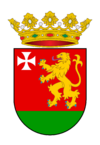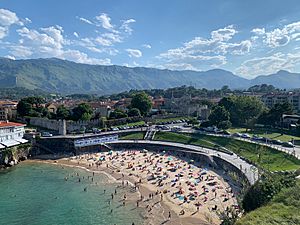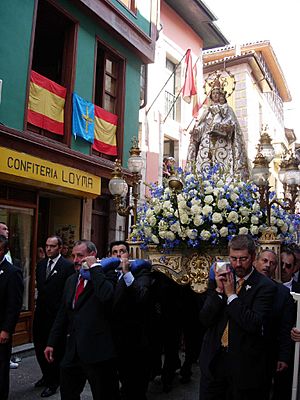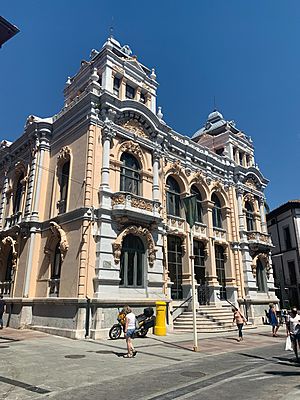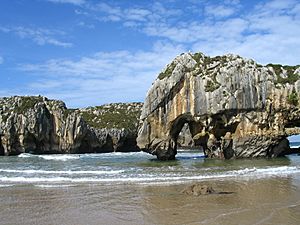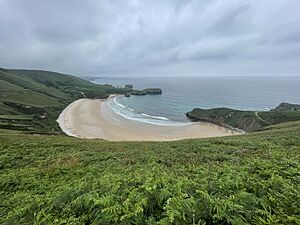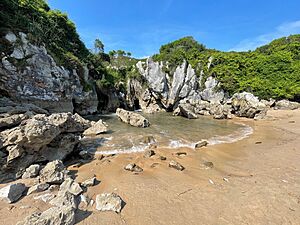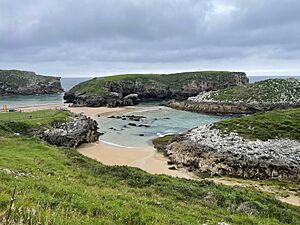Llanes facts for kids
Quick facts for kids
Llanes
|
|||
|---|---|---|---|
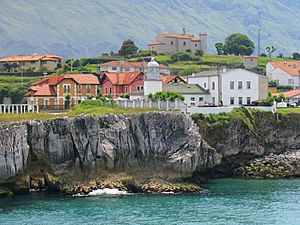
The Llanes Port's lighthouse in Asturias.
|
|||
|
|||
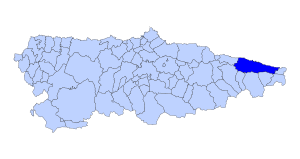
Location of Llanes
|
|||
| Country | |||
| Autonomous community | |||
| Province | Asturias | ||
| Comarca | Oriente | ||
| Capital | Llanes | ||
| Area | |||
| • Total | 263.59 km2 (101.77 sq mi) | ||
| Elevation | 1,177 m (3,862 ft) | ||
| Population
(2018)
|
|||
| • Total | 13,639 | ||
| • Density | 51.7432/km2 (134.014/sq mi) | ||
| Demonym(s) | Llanisco/a | ||
| Time zone | UTC+1 (CET) | ||
| • Summer (DST) | UTC+2 (CEST) | ||
| Postal code |
33500
|
||
| Official language(s) | Spanish | ||
Llanes is a beautiful town and municipality located in the northern part of Spain, in the region of Asturias. It stretches for about 30 kilometers along the coast. To the south, it is protected by the tall Sierra del Cuera mountains, which reach over 1,100 meters high.
Llanes is part of Spain's Costa Verde, meaning "Green Coast." This area is famous for its amazing coastal views, including 32 white sand beaches. The mountains here are covered in deep green forests. Llanes is also north of the Picos de Europa, a mountain range mostly made of limestone. Most people in Llanes live near the coast. The town of Llanes itself has about 4,000 residents, out of a total of 13,000 in the whole district. The local traditions, food, and festivals are well-known for their vibrant colors and rich history.
Contents
Exploring the Town of Llanes
Llanes is a historic fishing port with a busy harbor. It has many interesting buildings and traditions. Parts of the old town walls date back to 1206. You can still see a medieval Tower of Llanes. There is also a beautiful church, the Basilica, dedicated to the Virgin Mary.
Inside the Basilica, a special plaque remembers 65 sailors from Llanes. They sailed on three ships from Llanes that were part of the Spanish Armada in 1588. Another plaque marks the visit of Emperor Charles V. He stayed in Llanes for two nights in 1517 on his way to be crowned King.
Llanes is a popular place for tourists, especially in summer. Most visitors come from other parts of Spain. The town has many traditional shops and restaurants. In the evenings, the "zona de copas" (area with bars and cafes) is lively. There are three beaches and a lovely cliff-top walk called the Paseo de San Pedro. This walk adds to the town's charming coastal feel. Nearby, you can find the unique Playa de Gulpiyuri, a beach that is not directly on the sea!
Villages and Parishes
Llanes is divided into 28 smaller areas called parishes. Each parish has its own unique character and charm. Here are some of them:
- Andrín
- Ardisana
- Barru
- Caldueñu
- Carranzo
- Celoriu
- Cue
- Ḥontoria
- La Borbolla
- Llanes
- Los Caleyos
- Los Carriles
- La Malatería
- Meré
- Naves
- Nueva
- Parres
- Pendueles
- Po
- Porrúa
- Posada de Llanes
- Pría
- Purón
- Rales
- San Roque l'Acebal
- Tresgrandas
- Vibañu
- Vidiago
Mountains and Nature
When you look south from anywhere in Llanes, you will see a tall limestone mountain wall. This wall rises steeply to 744 meters at a peak called L'Abá. Behind this wall is the even higher Sierra del Cuera mountain range. The highest point in Llanes within this range is La Peña Blanca, at 1177 meters.
Between these two mountain ridges are hidden valleys. These valleys drain into amazing cave systems. The largest of these hidden valleys is La Llosa de Viango. Unlike the rocky peaks of the Picos de Europa further south, these valleys are green and full of pastures. These mountains are part of the Cordillera Cantábrica, a large mountain chain that runs across northern Spain.
This area was also the site of a historic event. From September 6 to September 22, 1937, a smaller group of 5,000 Republican soldiers bravely defended this area against over 33,000 Nationalist soldiers. This strong defense is known as the Battle of El Mazuco.
Amazing Caves
The Llanes district has many caves. Some are very old and important, like an archaeological site near Nueva. The Cueva Bolado (43°24′04″N 4°45′51″W / 43.40111°N 4.76417°W) near La Pereda also has ancient art and open passages you can explore.
There are also several large "wild" cave systems, which are explored by experts. These include:
- The Bolugo-Caldueñín system under El Mazuco.
- The Rales system (43°24′43″N 4°53′39″W / 43.41194°N 4.89417°W).
- El Cuevón de Pruneda, near Purón (43°22′39″N 4°43′23″W / 43.37750°N 4.72306°W).
These caves were first explored in detail by cave explorers from Oxford University Cave Club and Speleogroup. People also think there might be a big cave system hidden under La Llosa de Viango valley.
Fun Fiestas and Celebrations
Llanes loves its festivals! The town's main celebration is for its patron saint, Nuestra Señora del Conceyu, on August 15. Besides this, there are three big summer festivals in the town:
- July 22: La Magdalena
- August 16: San Roque
- September 8: La Guía
These festivals are organized by three different groups, called "Bandos." These groups have a friendly rivalry and each year they try to make their festival the best!
Outside the main town, the smaller villages and parishes also celebrate their own festivals for their patron saints. A special tradition is La Hoguera ("The bonfire"). This involves cutting down a tall eucalyptus tree from the mountain. Then, its branches and bark are removed, and the tall trunk is set up in the village. This is celebrated in several villages, like Celorio, Balmori, and Pancar.
Another famous event is the Noche de las Brujas (Night of the Witches) in Barro. This is a very traditional and popular celebration based on old Asturian stories and myths. The celebration of Santa Ana, the patron saint of Naves, is also popular, especially because of the free concerts by famous musicians.
Sports in Llanes
Llanes is home to several sports teams, offering different activities for people of all ages.
| Team | Town | Sport | League | Tier | Stadium/Arena |
|---|---|---|---|---|---|
| Club Baloncesto Crossover Llanes | Llanes | Basketball | Segunda Autonómica | 7 | Polideportivo Municipal de Llanes |
| Urraca CF (women's) | Posada de Llanes | Football | Femenino Regional | 3 | Campo de Fútbol Municipal "La Corredoria" (Posada de Llanes) |
| CD Llanes | Llanes | Football | Tercera División | 4 | Campo Municipal de San José |
| Urraca CF (men's) | Posada de Llanes | Football | Regional Preferente | 5 | Campo de Fútbol Municipal "La Corredoria" (Posada de Llanes) |
| CD Aguilar Balompié | Bricia (Llanes) | Football | Segunda Regional | 7 | Campo de Fútbol Municipal "La Corredoria" (Posada de Llanes) |
| CD San Jorge | Nueva (Llanes) | Football | Segunda Regional | 7 | Campo Municipal "El Ereba" (Nueva de Llanes) |
| CD Llanes | Llanes | Futsal | Primera División Regional | 6 | Polideportivo Municipal de Llanes |
| AD Playas de Llanes | Llanes | Volleyball | Segunda Asturiana | Polideportivo Municipal de Llanes | |
| Escuela de Voley 9x18 Llanes-Ribadedeva | Llanes/Ribadedeva | Volleyball | School Competitions | ----- | ------------------------------------------------------------------------------------ |
See also
 In Spanish: Llanes para niños
In Spanish: Llanes para niños
 | Percy Lavon Julian |
 | Katherine Johnson |
 | George Washington Carver |
 | Annie Easley |



